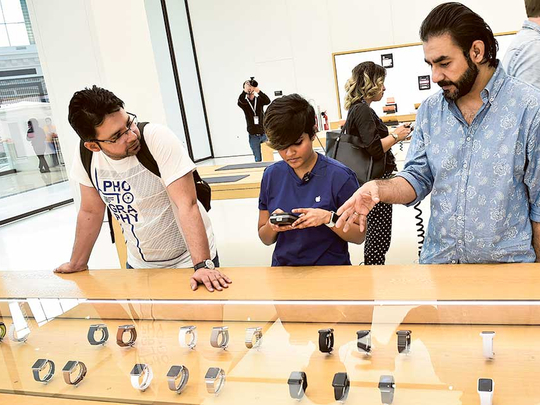
Dubai: Compared to the iPhone 7, the response to Apple’s second generation Watch at the tech giant’s Dubai store on Saturday morning was muted.
But for some, the second generation watch, which is faster, waterproof and equipped with GPS, was a key accessory to go alongside a gleaming new iPhone.
Since 6am, a full two hours before the store opened, Jose Ranjit, an Indian expat, and his wife Rency have waited outside.
Of the pair, Jose says he’s the more ardent Apple fan. To beat the long, snaking crowd who have not yet been ushered inside, he pre-ordered their two new gadgets — a rose-gold coloured iPhone for her and a Watch with a cocoa-brown strap for himself.
“I expected a queue, but not like this,” he says. “I’ve seen this abroad, in the US and other countries. But it’s the first time the Apple store [in Dubai] is having an event like this.”
Jose says he waited until now to buy the Apple Watch because of the new model’s water resistance. But his love of the California-based firm’s products stretches far back.
Taking a bite
“Adam ate it, and gave it to me, so I said I’d take a bite of the Apple as well,” as clapping and cheering store workers invite another customer through the shop’s 16-foot-high glass doors.
Crowd numbers were boosted by the wave of tourists from neighbouring states who flock to Dubai during the Eid Al Adha break.
Spending nine hours of precious vacation time standing in a queue seemed to be time well spent for Rakan Al Romeh, a Saudi tourist who is now sitting with his wife, Randa and unboxing his gleaming new toy.
“I came mainly for the Apple Watch,” he says. Its extra features make it worth the Dh1,499 price tag for the base model,” he adds.
Apple hopes for its second generation of Watches to entice far more wearers, following months of sluggish sales of the first model.
Although the notoriously close-lipped tech giant did not release figures, analysts said in July that sales had dropped by over half since its April roll-out last year.











